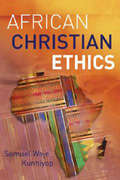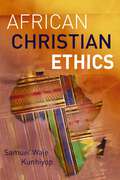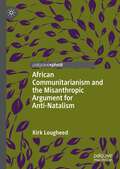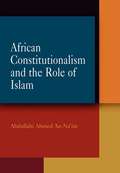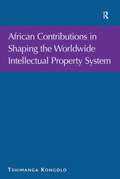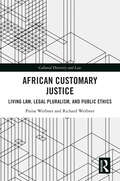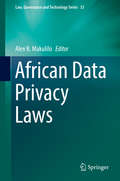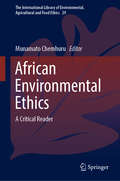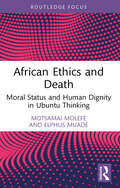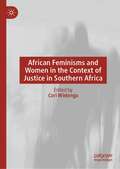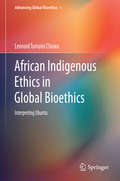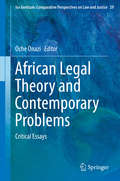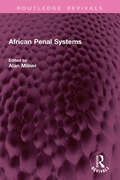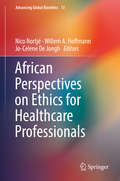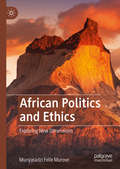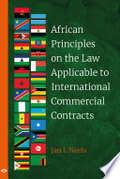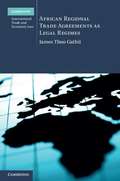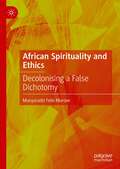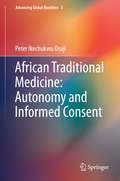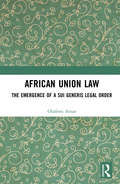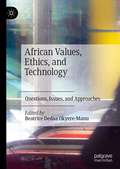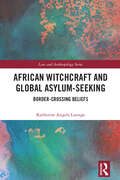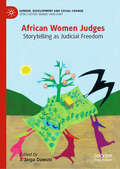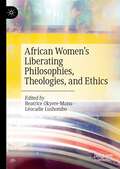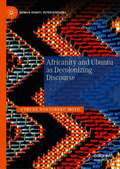- Table View
- List View
African Christian Ethics
by Samuel Waje KunhiyopThis is an introduction to African Christian Ethics for Christian colleges and Bible schools. The book is divided into two parts. The first part deals with the theory of ethics, while the second discusses practical issues. The issues are grouped into the following six sections: Socio-Political Issues, Financial Issues, Marriage Issues, Sexual Issues, Medical Issues, and Religious Issues. Each section begins with a brief general introduction, followed by the chapters dealing with specific issues in that area. Each chapter begins with an introduction, discusses traditional African thinking on the issue, presents an analysis of relevant biblical material, and concludes with some recommendations. There are questions at the end of each chapter for discussion or personal reflection, often asking students to reflect on how the discussion in the chapter applies to their ministry situation.
African Christian Ethics (Hippo Ser.)
by Samuel Waje KunhiyopThis is an introduction to African Christian ethics for Christian colleges and Bible schools. The book is divided into two parts. The first part deals with the theory of ethics, while the second discusses practical issues. The issues are grouped into the following six sections: Socio-Political Issues, Financial Issues, Marriage Issues, Sexual Issues, Medical Issues, and Religious Issues. Each section begins with a brief general introduction, followed by the chapters dealing with specific issues in that area. Each chapter begins with an introduction, discusses traditional African thinking on the issue, presents an analysis of relevant biblical material, and concludes with some recommendations. There are questions at the end of each chapter for discussion or personal reflection, often asking students to reflect on how the discussion in the chapter applies to their ministry situation.
African Communitarianism and the Misanthropic Argument for Anti-Natalism
by Kirk LougheedAnti-natalism is the provocative view that it is either always or almost always all-things-considered wrong to procreate. Philanthropic anti-natalist arguments say that procreation is always impermissible because of the harm done to individuals who are brought into existence. Misanthropic arguments, on the other hand, hold that procreation is usually impermissible given the harm that individuals will do once brought into existence. The main purpose of this short monograph is to demonstrate that David Benatar’s misanthropic argument for anti-natalism ought to be endorsed by any version of African Communitarianism. Not only that, but there are also resources in the African philosophical tradition that offer unique support for the argument. Given the emphasis that indigenous African worldviews place on the importance of procreation and the immediate family unit this result is highly surprising. This book marks the first attempt to bring anti-natalism into conversation with contemporary African ethics.
African Constitutionalism and the Role of Islam
by Abdullahi Ahmed An-Na'imConstitutionalism is steadily becoming the prevalent form of governance in Africa. But how does constitutionalism deal with the lingering effects of colonialism? And how does constitutional law deal with Islamic principles in the region? African Constitutionalism and the Role of Islam seeks to answer these questions. Constitutional governance has not been, nor will be, easily achieved, Abdullahi Ahmed An-Na'im argues. But setbacks and difficulties are to be expected in the process of adaptation and indigenization of an essentially alien concept--that of of nation-state--and its role in large-scale political and social organization.An-Na'im discusses the problems of implementing constitutionalized forms of government specific to Africa, from definitional to conceptual and practical issues. The role of Islam in these endeavors is open to challenge and reformulation, and should not be taken for granted or assumed to be necessarily negative or positive, An-Na'im asserts, and he emphasizes the role of the agency of Muslims in the process of adapting constitutionalism to the values and practices of their own societies. By examining the incremental successes that some African nations have already achieved and An-Na'im reveals the contingent role that Islam has to play in this process. Ultimately, these issues will determine the long-term sustainability of constitutionalism in Africa.
African Contributions in Shaping the Worldwide Intellectual Property System
by Tshimanga KongoloAfrica is playing an increasingly more significant role in the domain of international intellectual property law, and this book underlines the contributions made by African countries as a group to the development of the current international IP system. It examines in detail their breakthrough proposals and initiatives at the WTO, WIPO and WHO with regard to IP and public health; IP and traditional knowledge, traditional cultural expressions and genetic resources; IP and biodiversity; and exceptions and limitations to copyright. Using Botswana, Burundi, Egypt, Ghana, Kenya, Mauritius, Morocco, South Africa and Tunisia as examples, it examines the systems under which these IP subject matters are protected. From a regional perspective, the book also analyses some initiatives taken by ARIPO, OAPI and the African Union to protect traditional knowledge and traditional cultural expressions, especially in relation to protection of the rights of local farming communities and breeders, regulation of access to biological resources, genetically modified organisms and the proposed establishment of the new Pan-African Intellectual Property Organization (PAIPO). Demonstrating how Africa is now an active player on the international IP scene, this book will be invaluable to those interested in intellectual property law, business and commercial law, and African and international law.
African Customary Justice: Living Law, Legal Pluralism, and Public Ethics (Cultural Diversity and Law)
by Richard Werbner Pnina WerbnerThis book presents an important ethnographic and theoretical advance in legal anthropological scholarship by interrogating customary law, customary courts and legal pluralism in sub-Saharan Africa. It highlights the vitality and continued relevance of customary justice at a time when customary courts have waned or even disappeared in many postcolonial African nations. Taking Botswana as a casestudy from in-depth fieldwork over a fifty-year period, the book shows, the ‘customary’ is robustly enduring, central to settling interpersonal disputes and constitutive of the local as well as the national public ethics. Customary law continues to be constitutionally protected, authorised by the country’s past as an authentic, viable legacy, from the British colonial period of indirect rule to the postcolonial state’s present development as a highly bureaucratised democracy. Along with a theoretical overview of the underlying issues for the anthropology and sociology of law, the book documents customary law as living law in the context of legal pluralism. It takes a legal realist approach and highlights the need to pay close attention to the lived experience of justice and its role in the production of legal subjectivities. The book will be valuable to Africanists but also, more broadly, to social scientists, social historians and socio-legal scholars with interests in law and social change, public ethics and personal morality, and the intersection of politics and judicial decision making.
African Data Privacy Laws (Law, Governance and Technology Series #33)
by Alex B. MakuliloThis volume presents analyses of data protection systems and of 26 jurisdictions with data protection legislation in Africa, as well as additional selected countries without comprehensive data protection laws. In addition, it covers all sub-regional and regional data privacy policies in Africa. Apart from analysing data protection law, the book focuses on the socio-economic contexts, political settings and legal culture in which such laws developed and operate. It bases its analyses on the African legal culture and comparative international data privacy law. In Africa protection of personal data, the central preoccupation of data privacy laws, is on the policy agenda. The recently adopted African Union Cyber Security and Data Protection Convention 2014, which is the first and currently the only single treaty across the globe to address data protection outside Europe, serves as an illustration of such interest. In addition, there are data protection frameworks at sub-regional levels for West Africa, East Africa and Southern Africa. Similarly, laws on protection of personal data are increasingly being adopted at national plane. Yet despite these data privacy law reforms there is very little literature about data privacy law in Africa and its recent developments. This book fills that gap.
African Environmental Ethics: A Critical Reader (The International Library of Environmental, Agricultural and Food Ethics #29)
by Munamato ChemhuruThis book focuses on under-explored and often neglected issues in contemporary African environmental philosophy and ethics. Critical issues such as the moral status of nature, African conceptions of animal moral status and rights, African conceptions of environmental justice, African relational Environmentalism, ubuntu, African theocentric and teleological environmentalism are addressed in this book. It is unique in so far as it goes beyond the generalized focus on African metaphysics and African ethics by exploring how these views might be understood differently in order to conceptualize African environmental ethics. Against the background where environmental problems such as pollution, climate change, extinction of flora and fauna, and global warming are plain to see, it becomes useful to examine how African conceptions of environmental ethics could be understood in order to confront some of these problems facing the whole world. This book will be of value to undergraduate students, graduate students and academics working in the area of African Philosophy, African Environmental Ethics and Global Ethics in general.
African Ethics and Death: Moral Status and Human Dignity in Ubuntu Thinking (Routledge Studies in African Philosophy)
by Motsamai Molefe Elphus MuadeThis book analyzes the concepts of moral status and human dignity in African philosophy and applies them to the moral problems associated with death. The book first challenges the criticism and rejection of moral status in African philosophy and then continues to consider how moral personhood is defined in African ethical theories, investigating which entities have full moral status or moral personhood and are therefore worthy of full ethical consideration. It then applies this theory to the problems associated with death. In the medical context, will an African theory of moral status permit or forbid euthanasia? Do we have moral obligations towards dead human bodies? Overall, the book provides an important African axiological contribution to debates on global ethics and moral philosophy. Providing an important overview of the ethical problems associated with the biological fact of death, this book will be of interest to researchers across the fields of philosophy and African studies.
African Feminisms and Women in the Context of Justice in Southern Africa
by Cori WielengaThis book explores justice ‘on the ground’ in Southern African communities, and in particular the roles that women play in these processes. Justice on the ground is often critiqued for being male-dominated and patriarchal. This volume seeks to unpack and problematize this assumption through the case studies of Namibia, Zimbabwe, Mozambique and South Africa. Contributions focus on the lived experiences of women and the intersections of race, class, culture and the colonial experience that shape their lives. In the rural and peri-urban contexts discussed in this book, justice on the ground is found to be relational. The network of relationships between people and the well-being and health of a community as an integral whole continue to be of central importance as the survival of the community depends on the entire community functioning interdependently. An engagement with African feminisms is helpful in providing a number of lenses, or simply questions, through which to read the case studies. These case studies reveal the complex and organic ways in which women have power and influence in relation to justice on the ground which may not be immediately obvious.
African Indigenous Ethics in Global Bioethics: Interpreting Ubuntu (Advancing Global Bioethics #1)
by Leonard Tumaini ChuwaThis book educates whilst also challenging the contemporary schools of thought within philosophical and religious ethics. In addition, it underlines the fact that the substance of ethics in general and bioethics/healthcare ethics specifically, is much more expansive and inclusive than is usually thought. Bioethics is a relatively new academic discipline. However, ethics has existed informally since before the time of Hippocrates. The indigenous culture of African peoples has an ethical worldview which predates the western discourse. This indigenous ethical worldview has been orally transmitted over centuries. The earliest known written African text containing some concepts and content of ethics is the "Declaration of Innocence" written in 1500 B. C. , found in an Egyptian text. Ubuntu is an example of African culture that presents an ethical worldview. This work interprets the culture of Ubuntu to explain the contribution of a representative indigenous African ethics to global bioethics. Many modern scholars have written about the meaning of Ubuntu for African societies over centuries. Some scholars have viewed Ubuntu as the greatest contribution of African cultures to other world cultures. None of the scholars, however has explored the culture of Ubuntu as providing a representative indigenous ethics that can contribute to global bioethics as discussed in this book.
African Legal Theory and Contemporary Problems: Critical Essays (Ius Gentium: Comparative Perspectives on Law and Justice #29)
by Oche OnaziThe book is a collection of essays, which aim to situate African legal theory in the context of the myriad of contemporary global challenges; from the prevalence of war to the misery of poverty and disease to the crises of the environment. Apart from being problems that have an indelible African mark on them, a common theme that runs throughout the essays in this book is that African legal theory has been excluded, under-explored or under-theorised in the search for solutions to such contemporary problems. The essays make a modest attempt to reverse this trend. The contributors investigate and introduce readers to the key issues, questions, concepts, impulses and problems that underpin the idea of African legal theory. They outline the potential offered by African legal theory and open up its key concepts and impulses for critical scrutiny. This is done in order to develop a better understanding of the extent to which African legal theory can contribute to discourses seeking to address some of the challenges that confront African and non-African societies alike.
African Penal Systems (Routledge Revivals)
by Alan MilnerFirst published in 1969, African Penal Systems is the first book to explore the problems of African criminology. Sixteen distinguished contributors- sociologists, lawyers, and psychiatrists- each an authority on some aspect of African penal problems, have collaborated to produce it. Its first part gives a general survey of the penal systems of some fourteen African countries, variously English, French, or Portuguese inclined, or wholly autochthonous. Part two includes six specialist contributions on various detailed problems in the development and operation of the modern African systems.In his introduction Alan Milner, describes the sociological forces responsible for the increase of crime in Africa and examines the possibility of the growth of a peculiarly African approach to the solution of its penal problems. This is a must read for scholars and researchers African Studies, criminology, and African Law.
African Perspectives on Ethics for Healthcare Professionals (Advancing Global Bioethics #13)
by Nico Nortjé Willem A. Hoffmann Jo-Celene De JonghThis book focuses on ethical issues faced by a variety of healthcare practitioners across the Anglophone African continent. This important resource contains in-depth discussions of the most salient current ethical issues by experts in various healthcare fields. Each profession is described from both an African and a South African perspective, and thus contributes to dialogue and critical thinking around African ethics and decision-making. In this way the book provides readers with an understanding of the ethical issues at hand in various professions, including the practical implications of the ethical issues and how to address those effectively. This is a beneficial resource for all those involved in the various healthcare professions addressed in this book, including undergraduate students, lecturers, researchers and practitioners across the continent. Simply put, with the dynamic changes and challenges in healthcare across the globe and in Africa, this is an indispensable resource for healthcare practitioners.
African Politics and Ethics: Exploring New Dimensions
by Munyaradzi Felix MuroveIn this book, Munyaradzi Felix Murove explores African traditional ethical resources for African politics. Arguing that African ethics is integral to African post-colonial political contentious discourse, Murove invites the reader to reflect on various problematic political issues in post-colonial Africa and how African ethics has been applied in these situations. Starting with a succinct discussion of the scope of African ethics, he discusses how African ethical values have been applied by post-colonial politicians in the reconstruction of their societies. Further, Murove looks critically at the issue of African poverty and how the ethic of regional integration and economic cooperation among post-colonial African nation-states has been instrumental to efforts aimed at overcoming the scourge of poverty. The main question this book seeks to answer is: Are African traditional ethical values a panacea to modern African political problems?
African Principles on the Law
by Jan L NeelsThis booklet contains the first draft of the envisaged African Principles on the Law Applicable to International Commercial Contracts. The proposal could be used by national legislators on the continent and African economic integration organisations, particularly the African Union, in, respectively, domestic legislation and regional or supranational laws of a soft or binding nature. The existence of a reliable transnational legal infrastructure in respect of international commercial law, including commercial private international law, is a prerequisite for investor confidence, inclusive economic growth, sustainable development, and the ultimate alleviation of poverty on the African continent. The instrument may contribute to sustainable growth on a long-term basis. The regulation of private international law of contract is essential to the further development of the African Continental Free Trade Area.
African Regional Trade Agreements as Legal Regimes
by James Thuo GathiiAfrican regional trade integration has grown exponentially in the last decade. This book is the first comprehensive analysis of the legal framework within which it is being pursued. It will fill a huge knowledge gap and serve as an invaluable teaching and research tool for policy makers in the public and private sectors, teachers, researchers and students of African trade and beyond. The author argues that African Regional Trade Agreements (RTAs) are best understood as flexible legal regimes particularly given their commitment to variable geometry and multiple memberships. He analyzes the progress made toward trade liberalization in each region, how the RTAs are financed, their trade remedy and judicial regimes and how well they measure up to Article XXIV of GATT. The book also covers monetary unions as well as intra-African regional integration, and examines Free Trade Agreements with non-African regions including the Economic Partnership Agreements with the European Union.
African Spirituality and Ethics: Decolonising a False Dichotomy
by Munyaradzi Felix MuroveThis book explores the symbiotic relationship that exists between African spirituality and ethics. Felix Murove discusses how these two concepts are entwined, and illustrates how they play a role in applied ethical issues. He argues that the general understanding of spirituality in Africa stems from Christianity, which has had a negative impact on African indigenous spirituality. The conceptual tools that run throughout the book are considerably Afro-centric, a methodological strategy which inevitably requires the reader to adopt some prior willingness to learn these Afro-centric concepts without easily resorting to western Christian and philosophical categories of thought. The book advocates for an Afro-centric conceptualization of spirituality and ethics, and encourages the reader to adopt a more holistic approach to African spirituality.
African Traditional Medicine: Autonomy And Informed Consent (Advancing Global Bioethics #3)
by Peter Ikechukwu OsujiThis book focuses on informed consent in African Traditional Medicine (ATM). ATM forms a large portion of the healthcare systems in Africa. WHO statistics show that as much as 80% of the population in Africa uses traditional medicine for primary health care. With such a large constituency, it follows that ATM and its practices should receive more attention in bioethics By comparing the ethics of care approach with the ATM approach to Relational Autonomy In Consent (RAIC), the authors argue that the ATM focus on consent based on consensus constitutes a legitimate informed consent. This book is distinctive insofar as it employs the ethics of care as a hermeneutic to interpret ATM. The analysis examines the ethics of care movement in Western bioethics to explore its relational approach to informed consent Additionally, this is the first known study that discusses healthcare ethics committees in ATM.
African Union Law: The Emergence of a Sui Generis Legal Order
by Olufemi AmaoThis book explores the emergence of African Union (AU) law as a legal order and its implications for existing order in the region. As an authoritative text on the development of AU law, the book covers such pertinent issues as legislative powers, competences, direct effect in AU law, subsidiarity, interventionism, and enforcement of laws. Olufemi Amao argues that there is a gradual movement from intergovernmentalism to supranationalism in the African Union legal order, and explores how this trajectory gradually and incrementally de-emphasises the discourse on nation state sovereignty; a concept that has caused many problems in the African context. Drawing upon EU law as a comparison, the book also examines how the development of supranationalism affects crucial issues such as human rights, democratic reforms, territorial matters, tribal and religious disputes, and economic relations. As a comprehensive examination of the development of law within a union, this book will be of great interest and use to students, scholars and practitioners in international law, international relations, and African studies.
African Values, Ethics, and Technology: Questions, Issues, and Approaches
by Beatrice Dedaa Okyere-ManuThis book charts technological developments from an African ethical perspective. It explores the idea that while certain technologies have benefited Africans, the fact that these technologies were designed and produced in and for a different setting leads to conflicts with African ethical values. Written in a simple and engaging style, the authors apply an African ethical lens to themes such as: The Fourth Industrial Revolution, the moral status of technology, technology and sexual relations, and bioethics and technology.
African Witchcraft and Global Asylum-Seeking: Border-Crossing Beliefs (Law and Anthropology)
by Katherine LuongoThis book analyzes how over the last two decades, immigration regimes in three primary refugee-receiving states in the Global North – Canada, Australia, and the United Kingdom – have engaged with allegations about witchcraft-driven violence made by asylum seekers coming from Anglophone countries across the African continent. The work intervenes at the nexus of anthropological, historical, legal, developmental, and human rights literatures to offer fresh insights into extrajudicial violence and global migration. Taking witchcraft-based asylum cases as its focal point, it argues that the recent dramatic expansion in claims to refugee protection under the ‘particular social group’ category of the 1951 UN Refugee Convention reflects immigration authorities’ increasing willingness to consider how legally recognizable persecution can derive from cultural practices and beliefs. Reflecting critically on such cases, it advances understandings of how witchcraft beliefs and practices have persisted as significant engines of violence in the contemporary world. It sheds light both on the limits of legal pluralism and cultural relativism in asylum adjudication and on how social scientific expertise contributes not simply to the flow of ideas, but also to the channelling of people across national, cultural, and epistemological boundaries. The book will be essential reading for students and researchers in legal anthropology, African studies, human rights, transnational history, migration and refugee law and policy, and the history and anthropology of witchcraft.
African Women Judges: Storytelling as Judicial Freedom (Gender, Development and Social Change)
by J. Jarpa DawuniThis edited volume centers the voices of African women judges as agents of justice and equality. The legal and personal narratives approach in the book privileges the contributors’ lived experiences, professional trajectories, contributions and challenges. The legal narrative storytelling approach also contributes to oral histories of African indigenous knowledge production and transfer. By highlighting the substantive representation of women in African judicial leadership, the chapters examine their impact on the development of jurisprudence, judicial administration, and contributions to the rule of law, access to justice, and women's rights in contemporary Africa. This book significantly contributes to the diversity of knowledge and representation in the global discourse on gender and judging, offering a novel contribution to the growing literature on African women judges.
African Women’s Liberating Philosophies, Theologies, and Ethics
by Beatrice Okyere-Manu Léocadie LushomboThis volume explores the ethical and philosophical paradigms presented by most of the influential Matriarchs of the Circle of African Women Theologians. It critically evaluates the effectiveness of their ethical and philosophical theories, models, and frameworks in pursuing justice and liberation for women in Africa and globally. The authors address critical questions: How have African women theologians reimagined existing ethical paradigms? What original ethical and philosophical ideas have they generated? How have their ethical frameworks influenced the theologies and interpretations they have developed? What purposes do their ethical and philosophical paradigms serve? How do these renderings intersect with various social categories, including gender, race, class, sexuality, capitalism, and colonialism? What liberating frameworks do they propose? The volume further explores the dialogue between distinct African contexts and universal experiences and values. It explores how universal themes such as humanity, human dignity, rights, justice, motherhood, and more can coexist with communal African concepts and themes. It contemplates how embracing African approaches engages these themes more globally, bringing together particular African contexts of women and the universal ethical, philosophical, and theological theories, models, and frameworks to advance the cause of justice and liberation for African women and women worldwide into the future.
Africanity and Ubuntu as Decolonizing Discourse (Human Rights Interventions)
by Otrude Nontobeko MoyoThis book explores and discusses emerging perspectives of Ubuntu from the vantage point of “ordinary” people and connects it to human rights and decolonizing discourses. It engages a decolonizing perspective in writing about Ubuntu as an indigenous concept. The fore grounding argument is that one’s positionality speaks to particular interests that may continue to sustain oppressions instead of confronting and dismantling them. Therefore, a decolonial approach to writing indigenous experiences begins with transparency about the researcher’s own positionality. The emerging perspectives of this volume are contextual, highlighting the need for a critical reading for emerging, transformative and alternative visions in human relations and social structures.
